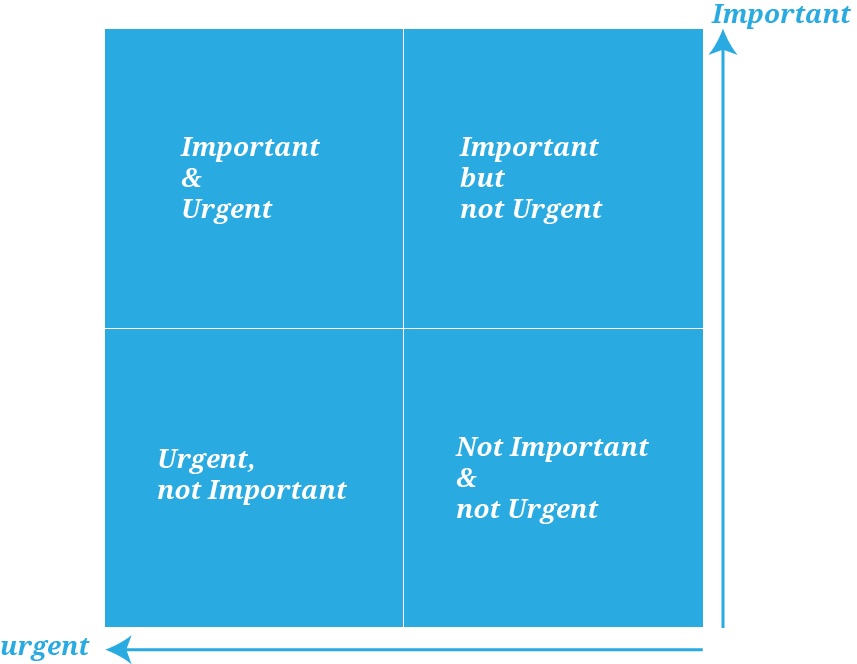Have you ever heard the expression, “time is money?” It’s not true. During a Charlie Rose interview,[1] the billionaire Bill Gates, along with Warren Buffet, drove home the point that time is the only commodity that money cannot buy.
Urgent/Important Principle
Prioritizing our activities is a key component of managing our time well. How can we decide which activities deserve our attention? Dwight D. Eisenhower, while giving a speech to the Second Assembly of the World Council of Churches, quoted an unnamed college president as saying, “I have two kinds of problems, the urgent and the important. The urgent are not important, and the important are never urgent.”[2] This statement by Eisenhower has become known as the Eisenhower Urgent/Important Principle. You may recognize it from Stephen Covey’s book The 7 Habits of Highly Effective People. Those employing this principle can use the urgent important decision matrix.
If we divide a square into four quadrants and label them as 1) Important and Urgent; 2) Important but not Urgent; 3) Not Important but Urgent; and 4) Not Important and not Urgent, that square would look something like the diagram below:

Tasks that are important and urgent require our attention first. Tasks that are important but are not urgent should be scheduled and done as soon as possible. Tasks that are urgent but not important should be delegated to someone. Tasks that are not urgent and not important should be ignored.
What would godly time management look like for a Christian family?
Let’s read some Bible verses that might help explain how families should manage their time. Matthew 6:33 reads, “But seek first the kingdom of God and His righteousness, and all these things will be added to you.” We are to accept the Lordship of God in our lives and put Him first. As stewards of all God has given us, we are to return to God what He has requested of us. Proverbs 3:9-10 reads:
Honor the LORD with your wealth, with the first fruits of all your crops; then your barns will be filled to overflowing, and your vats will brim over with new wine.
We are to bring our best to God, and this includes our time. The fourth commandment asks us to “remember the Sabbath day,” and dedicate one-seventh of our time to bringing rest to those around us. God tells us in Isaiah 58:13 that if we remember the Sabbath and call the “Sabbath a delight,” then He promises, “you will find your joy in the Lord, and I will cause you to ride in triumph on the heights of the land.”
Consider how you can encourage your family to call the Sabbath “a delight.” This may take some brainstorming. Involve all members of the family in the process. Ask them how they would like to bring Sabbath rest to others. Their answers may surprise you. Read together the New Testament stories about how Jesus spent the Sabbath for inspiration.
Children spell love T-I-M-E
Zig Zigler said, “For a child, love is spelled T-I-M-E.”[3] Jesus made time to be with children. As recorded in Mark 10:14 Jesus says, “Let the little children come to me, and do not hinder them.” God instructs parents in Deuteronomy 6:7 to weave sharing their faith into their daily life: “Impress them on your children. Talk about them when you sit at home and when you walk along the road, when you lie down and when you get up.”
Love is patient, love is kind. It does not envy, it does not boast, it is not proud. It does not dishonor others, it is not self-seeking, it is not easily angered, it keeps no record of wrongs. Love does not delight in evil but rejoices with the truth. It always protects, always trusts, always hopes, always perseveres.
These verses from 1 Corinthians 13:4-7 are familiar. I want to help you to think about them in the context of spending time with your family. Rewrite these verses in first person: “Because I love my (family/spouse/child) I will be patient . . .”
When you consider family activities, share Paul’s advice to the Philippians with your family. In chapter four, verses eight and nine, Paul writes, “Finally, brothers and sisters, whatever is true, whatever is nobel, whatever is right, whatever is pure, whatever is lovely, whatever is admirable—if anything is excellent or praiseworthy—think about such things.”
But I have no time!
With two working parents being common and most families living in congested cities with long commutes, finding minutes in our day for each member of our family can feel overwhelming. In 1 Thessalonians 2:11-12, Paul gives a description of parenting:
For you know that we dealt with each of you as a father deals with his own children, encouraging, comforting, and urging you to live lives worthy of God, who calls you into His kingdom and glory.
You may not need to do anything more, but what you are doing may need to be improved so that you have a stronger connection and the quality of what you are doing is increased. It is not about what we do for our family, but how much they feel it. If they don’t feel connected and/or validated, then there are some adjustments and tweaks to make.
How do mornings feel at your house? Do you operate as your children’s alarm clock and taskmaster? In Genesis 33:14, Jacob tells his brother Esau that he will lead at “the pace of the children.” Katie Faris reflected on this verse on the Facebook page Loving My Children[4] .
Jacob’s words slow me down every time.
At the pace of the children…
When my son can’t find his shoe and everyone else is in the car.
When my daughter takes twice as long to eat her lunch as the rest of her siblings.
When my two-year-old decides to potty-train, something I didn’t write on the agenda for the first week of school.
When one child takes longer to learn to read than other siblings.
When a sleepy toddler needs to be carried halfway through a family walk.
Whenever I feel like a child is slowing me down; whenever my plans or time schedule are interrupted; whenever my children move slower than I prefer, I remember—
At the pace of the children.
Instead of raising his voice or driving his family too hard, and instead of forcing his family to speed up, Jacob slowed down. He led his family slowly. He let them set the pace.
He recognized their limitations and acknowledged their needs. He adjusted to their pace instead of making them adapt to his speed.
In other seasons of our lives, our children are no longer living with us in our home. Time management for the Christian family will look different when the focus has shifted from daily life in the home. What stays the same is that time with God and time with each other is how we grow and maintain relationships.
[1] Charlie Rose interview (Available here: https://www.youtube.com/watch?v=nH5K0yo-o1A )
[2] Eisenhower, Dwight D. (1954) “Address at the Second Assembly of the World Council of Churches, Evanston, Illinois,” August 19, 1954. Online by Gerhard Peters and John T. Woolley, The American Presidency Project. (Available here: https://www.presidency.ucsb.edu/documents/address-the-second-assembly-the-world-council-churches-evanston-illinois)
[3] Zigler, Zig (2002) p. 105 “Raising Positive Kids in a Negative World”
[4] Katie Faris, Loving My Children, https://www.facebook.com/katietfaris/photos/a.106243590723703/134106731270722/?type=3&theater
By Kate Wolfer, Editorial Assistant NAD Stewardship

